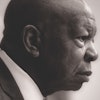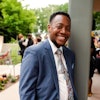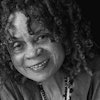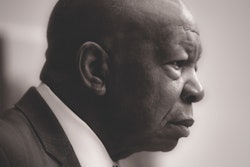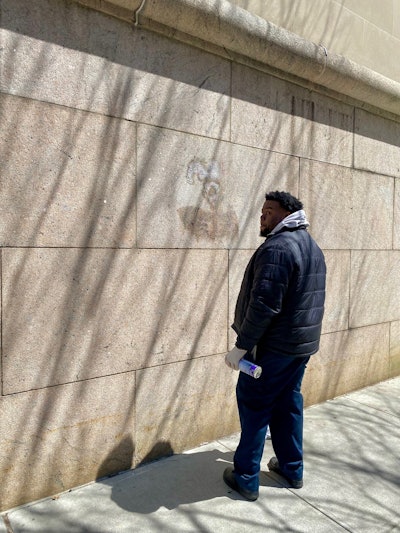 Akeem Luke washes away protest graffiti from the walls of Columbia University.
Akeem Luke washes away protest graffiti from the walls of Columbia University.
At Columbia University, Akeem Luke washed away graffiti from a wall bordering campus. The text once read “Free Gaza.” Now the lines are faded. In Luke’s two years of working on staff at the university, he said, he’s never seen students organize and protest like this before.
There is a quiet on campus that belies the chaos its seen in the last week. On April 18, following the establishment of a sit-in protest on Columbia’s South Lawn, Columbia President Dr. Minouche Shafik asked the NYPD to enter the encampment and begin making arrests. Shafik had just testified at the House Committee on Education and the Workforce as part of the committee’s investigation into antisemitism on campus. Over 100 students were arrested, and the university said it has suspended encamped students.
The institution has now moved all its classes to a hybrid format until the end of the semester.
On Tuesday, Soph Askanase and Sarah Borus from Barnard College, two Jewish students who were arrested for participating in the protest, said the most targeted antisemitism they have experienced on campus came from their own Jewish peers. Meanwhile, they said, anti-Muslim sentiment has been underreported and unacknowledged by the university.
“We’re here in support of our Palestinian brothers and sisters in Gaza. People are dying every day,” said Borus. “I and other Jewish students here are so disturbed. The media is more eager to talk about the experience of Jewish students than those in Gaza that are dying. We want you to focus on that, and Columbia’s culpability of that.”
In the past week, students at Yale University, New York University (NYU), MIT, the University of North Carolina at Chapel Hill, the University of Michigan, and more have gathered together for sit-in protests in solidarity with Columbia students and with Palestine. They have erected tents on their campuses, and some have barricaded themselves inside campus buildings. Many students from these universities have also been arrested.
The students are Jews, Palestinians, Muslims, and allies. They are calling for an end to Israel’s War on Gaza, waging since the Oct. 7 terrorist attack by Hamas against Israeli citizens that saw 1,200 murdered and 240 hostages taken. Since then, the Israeli Defense Force has all-but obliterated Gaza, and portions of the West Bank have been overrun by settler colonists. Over 33,000 Palestinians have been killed.
Students are asking their institutions to divest from military investments, particularly military weapons manufacturers and defense contractors with ties to Israel.
At NYU, students do not have a traditional campus with grass yards. On Monday, the NYU Palestine Solidarity Coalition, a student and faculty group, organized a protest at one of the few open spaces on their campus—hundreds of students piled into Gould Plaza next to NYU’s Stern School of Business. Protesters called for NYU to end apartheid at its Tel Aviv campus. By the evening, the NYPD began making its arrests, bringing in between 130 and 150 students and faculty members.
 Dr. Jacob Remes, clinical associate professor of history at NYU, joining in the Free Palestine protests at Washington Square Park on April 23.
Dr. Jacob Remes, clinical associate professor of history at NYU, joining in the Free Palestine protests at Washington Square Park on April 23.
Remes joined hundreds at Washington Square Park, central to NYU’s campus, who picked up the torch dropped at Gould Plaza.
“I think even people who have disagreements about the politics of Israel-Palestine understand that when the administration calls armed men to arrest and detain our colleagues, to rough them up, to send students to jail, that's a red line,” said Remes. “And you can be an ardent Zionist and still believe that you cannot be a university and do that.”
Remes is a member of Contract Faculty United, a faculty union at NYU. He is also a member of Jews for Racial and Economic Justice. He was joined in protest by his fellow history faculty, who all stepped out of a planned meeting to join their students and fellow faculty. He said he feels perfectly safe around his students and others at the park — but unsafe when the police are brought into the situation.
“Universities in the United States are supposed to be run by the faculty. And when that is suppressed by violence, it — this ceases to be a university,” said Remes. “So, we are here to say: We are the university, we demand the right to speak as the university, and we will not permit the administration to shut down dissent and the legitimate demands of the students.”
 The Community Guidelines at the Columbia University sit-in protest, photo courtesy of Gwen Walsh.
The Community Guidelines at the Columbia University sit-in protest, photo courtesy of Gwen Walsh.
“It seems like it’s been a very kind and compassionate, interfaith sort of presence,” said Walsh, noting that the community guidelines posted outside the encampment call for peace and civility. Among the guidelines listed are a purposeful commitment to the Palestinian people, no drug or alcohol use within the camp premises, an agreement for mutual protester anonymity, and a refusal to cooperate with the NYPD or any administrator who asks for names.
“I feel like students have the right to protest things,” said Walsh, adding that events that occur off campus can often disrupt these students’ missions. “In the area where it’s been kept exclusive to students, it’s very clear that the movement is about concern for fellow human beings and not wanting harm to come to anyone.”
Liann Herder can be reached at lherder@diverseeducation.com.

